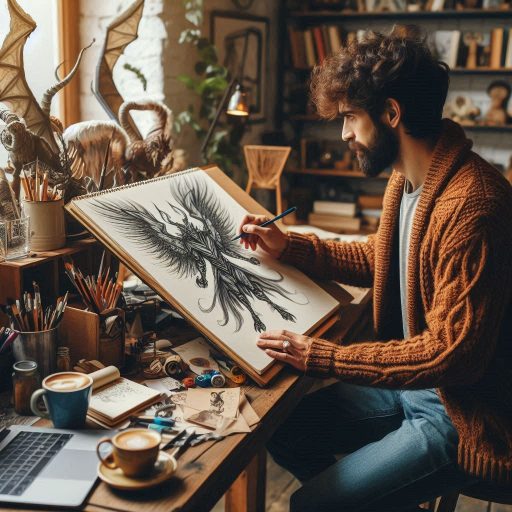Introduction
Concept Artist Personal Brand is crucial for concept artists aiming to stand out in a competitive industry.
It involves defining and promoting your unique artistic identity.
A strong personal brand showcases your style, skills, and vision, attracting potential clients and collaborators.
In the field of concept art, competition is intense.
Many talented artists vie for similar opportunities, making personal branding essential.
A well-defined brand helps you communicate your artistic voice effectively.
It differentiates you from others and highlights your specific strengths.
Personal branding also builds trust and recognition within the industry.
Clients prefer to work with artists they know and respect.
Establishing a recognizable brand increases your chances of being remembered.
This recognition can lead to more job opportunities and collaborations.
Moreover, a strong personal brand allows you to connect with your target audience.
By sharing your work and process on social media, you engage with potential fans and clients.
This interaction fosters a community around your art, enhancing your visibility.
Personal branding is vital for concept artists in today‘s competitive landscape.
It helps you establish your identity, gain recognition, and build meaningful connections.
Define Your Personal Brand
What Personal Branding Means for Concept Artists
Personal branding is essential for concept artists who want to stand out in a competitive industry.
Your personal brand represents your unique identity and reputation as an artist.
It reflects how you are perceived by clients, fellow artists, and industry professionals.
Defining your personal brand involves understanding what makes you different from others and how you want to be recognized for your work.
Identify Your Unique Skills, Strengths, and Style as a Concept Artist
To start, identify your unique skills, strengths, and artistic style.
Every concept artist brings unique qualities to their work. Some excel in specific drawing techniques.
Others focus on distinct approaches to character design. Many demonstrate mastery in color theory.
Each artist contributes something special to the creative process.
Take time to analyze your creative process and pinpoint what makes your work distinct.
By understanding these elements, you‘ll begin to shape your brand around your natural abilities and strengths.
Determine What Sets You Apart from Other Concept Artists in the Industry
Another important step in building your personal brand is to determine what sets you apart from other concept artists.
What makes your work stand out in a sea of talented individuals?
This could be your ability to work across various styles, your efficiency in meeting deadlines, or your exceptional collaboration skills.
Knowing your competitive edge allows you to promote yourself in a way that attracts the right clients and opportunities.
Personal branding also requires consistency.
Once you‘ve identified what makes you unique, reflect that in everything you do as an artist.
This includes your portfolio, social media presence, and interactions with clients.
By consistently presenting yourself and your work in alignment with your brand, you strengthen your reputation and build trust within the industry.
As you define your brand, think about the kind of projects or clients you want to attract.
Do you want to work on video games, films, or book illustrations? Your personal brand should align with your career goals and the types of opportunities you seek.
For example, if you want to work on dark, gritty character designs, showcase that style in your portfolio and online presence.
Your brand will naturally attract clients who are interested in the same aesthetic.
Creating a personal brand also means embracing your creative voice.
Don‘t be afraid to showcase your artistic perspective and approach.
Whether through blog posts, tutorials, or behind-the-scenes insights into your process, sharing your voice helps your audience connect with you on a deeper level.
Defining your personal brand as a concept artist requires a strategic approach.
Start by understanding your unique qualities.
Focus on standing out from others in the field.
Present yourself consistently across all platforms.
Read: Networking Events for Costume Designers
Create a Consistent Online Presence
A strong online presence is crucial for concept artists building their personal brand.
It helps showcase your work, connect with potential clients, and establish your reputation within the industry.
Creating consistency across your digital platforms ensures that people recognize and remember you for your unique style and expertise.
Establish a Professional Website or Online Portfolio Showcasing Your Work
Your website or online portfolio serves as the cornerstone of your personal brand.
It‘s where you can showcase your best work, highlight your skills, and tell your story as an artist.
Make sure your portfolio is well-organized, easy to navigate, and reflects your personal brand‘s style and tone.
Include high-quality images of your work, detailed descriptions of your process, and a professional bio that explains your journey as a concept artist.
Ensure the portfolio highlights your versatility while staying true to the niche you‘re targeting.
A well-crafted portfolio increases your chances of attracting clients who appreciate your unique style.
Curate Your Social Media Accounts to Reflect Your Personal Brand
Social media is a powerful tool for concept artists to grow their brand and reach a broader audience.
Platforms like Instagram, ArtStation, and Twitter offer opportunities to share your work and connect with fellow artists and potential clients.
To create a consistent online presence, curate your social media profiles to reflect your personal brand.
Post regularly and maintain a consistent aesthetic and tone across all platforms.
Share finished pieces, sketches, behind-the-scenes content, and even insights into your creative process.
Each post should align with the style and image you‘ve defined for your personal brand.
You should also think about your bio, profile picture, and banner images on social media.
These small details can reinforce your brand and help build a recognizable and professional presence.
Avoid mixing personal content with your professional accounts, as this can dilute your brand’s impact and confuse your audience.
Consistency in messaging and presentation is key to creating a cohesive digital identity.
Engage with Online Communities and Share Your Knowledge and Expertise
In addition to showcasing your work, engaging with online art communities is a valuable way to grow your personal brand.
Join forums, groups, or platforms where concept artists gather to share ideas and collaborate.
Engage in discussions to connect with fellow artists.
Provide feedback on others’ work to support their growth.
Participate in challenges or collaborations to boost your visibility.
These actions enhance your reputation within the art community.
Sharing your knowledge and expertise can also elevate your personal brand.
Post tutorials, process videos, or tips on your social media accounts or blog.
By positioning yourself as a resource for others, you not only help the community but also solidify your status as an expert in your field.
Establishing a consistent online presence involves maintaining a professional website, curating your social media accounts, and actively engaging with the community.
By doing so, you‘ll strengthen your personal brand, build credibility, and attract new opportunities as a concept artist.
Read: Freelance vs. In-House Costume Design Jobs
Network with Industry Professionals
Building a strong network is vital for any concept artist aiming to succeed.
Networking allows you to connect with other artists, potential clients, and industry professionals who can help you grow your career.
Actively engaging with the community and professionals in your field can lead to new opportunities, collaborations, and mentorship.
Attend Industry Events, Conferences, and Workshops to Meet Other Concept Artists
One of the most effective ways to build a network is by attending industry events, conferences, and workshops.
These gatherings offer a chance to meet fellow concept artists, art directors, and other professionals who share your interests.
Participating in these events allows you to exchange ideas, discuss trends, and learn about opportunities in the field.
At conferences, you may also have the opportunity to attend portfolio reviews or panel discussions with established artists.
These interactions can offer valuable feedback and insight into the current demands of the industry.
Conferences such as Comic-Con or specialized workshops for concept artists can be great places to start expanding your professional network.
Transform Your Career Today
Unlock a personalized career strategy that drives real results. Get tailored advice and a roadmap designed just for you.
Start NowCollaborate with Other Artists on Projects to Expand Your Network
Collaborating with other concept artists on projects is another excellent way to grow your network.
Collaboration allows you to learn from other artists and share skills that can enrich your own work.
Joint projects also open doors to larger professional circles, giving you the chance to meet people outside your immediate contacts.
Working on team projects enhances your reputation in the industry.
It also builds your teamwork and adaptability skills.
Clients and employers highly value these qualities.
By developing relationships through collaboration, you can create opportunities for future work and creative partnerships that enhance your portfolio and artistic growth.
Seek Out Mentorship Opportunities with Established Professionals in the Field
Seeking mentorship from experienced concept artists is a smart strategy for personal and professional development.
Mentors can offer career guidance, provide constructive criticism on your work, and introduce you to their network of industry contacts.
Look for mentors whose work inspires you or whose career path you admire.
You can approach potential mentors through networking events, online forums, or even through social media platforms like LinkedIn.
When seeking mentorship, it’s important to be respectful and professional, showing genuine interest in their work and a willingness to learn.
Mentorship relationships create long-term connections.
Established professionals often guide and share opportunities with trusted aspiring artists.
Networking with industry professionals is essential for building a personal brand as a concept artist.
Attending events, collaborating with other artists, and seeking mentorship help you establish valuable relationships that can further your career.
Actively growing your network opens doors to new opportunities and projects.
This connection fosters continued professional development.
It positions you for long-term success in the competitive concept art industry.
Read: Collaborating with Other Creative Roles
Develop a Signature Style
Creating a recognizable, signature style is crucial for building a personal brand as a concept artist.
A unique artistic style sets you apart from others, making your work memorable to clients and followers.
By developing a distinctive look and feel, you can attract the right opportunities and grow your professional reputation.
Experiment with Different Techniques and Mediums to Discover Your Unique Artistic Style
To develop a signature style, you need to experiment with a variety of techniques and mediums.
By trying different tools, approaches, and art forms, you will uncover what resonates with you.
This experimentation helps you understand your preferences and strengths, leading to the discovery of your own visual language.
Don‘t be afraid to push the boundaries of your comfort zone.
Whether you‘re using traditional or digital tools, learning new methods expands your skill set and opens the door to new creative possibilities.
Over time, you‘ll notice patterns in your work that define your unique style, something that will make your art easily recognizable.
Focus on Refining Your Skills in a Specific Niche or Genre Within Concept Art
Once you’ve explored different styles and techniques, it’s important to narrow your focus to a specific niche or genre.
Specializing in one area allows you to deepen your expertise and become known for a particular style or subject matter.
For example, you might focus on character design, environment creation, or fantasy worlds within the concept art field.
By honing your skills in a particular niche, you increase your chances of becoming an expert in that area, which can lead to more job opportunities and commissions.
Clients looking for a particular type of concept art will be drawn to your work because of your specialization.
Use Your Signature Style to Build Recognition and Attract Clients and Followers
Your signature style becomes a key component of your personal brand.
Once developed, it will help you stand out in a crowded industry.
People will recognize your work at a glance, which is a significant advantage when trying to attract clients or gain a following online.
Your style should be consistent across all your platforms, from your portfolio to your social media accounts.
Consistency builds recognition and reinforces your personal brand.
Over time, clients will seek you out because they know what to expect from your work, making you a preferred choice for projects that match your style.
Developing a signature style is an essential step in establishing yourself as a concept artist.
By experimenting with techniques, focusing on a niche, and maintaining consistency in your work, you can build a strong personal brand that sets you apart in the industry.
Your unique style will not only attract clients but also help you grow a loyal following that appreciates your artistic vision.
Read: Top Skills Needed for Art Educators and Instructors

Consistently Produce High-Quality Work
Producing high-quality work is essential for building a solid personal brand as a concept artist.
When you consistently deliver exceptional results, you set yourself apart from others in the industry.
Quality speaks volumes and will attract clients, collaborators, and followers who recognize and appreciate your talent.
Set High Standards for Your Work and Strive for Excellence in Every Project
To maintain a reputation for quality, you must set high standards for your work.
Approach each project, no matter its size, with the same level of dedication and professionalism.
Striving for excellence means paying attention to detail, meeting deadlines, and going above and beyond client expectations.
When you set the bar high, your reputation as a reliable and talented concept artist will grow.
Regularly assess your own work and ask yourself how you can improve.
Seeking feedback from peers and professionals also helps ensure your work reaches the highest standards.
Constant self-evaluation will keep your skills sharp and your projects top-notch.
Showcase Your Best Work in Your Portfolio and Online Profiles
Your portfolio is your most powerful marketing tool.
It should only include your best work, as this is the first thing potential clients and employers will see.
Highlight the projects that reflect your unique style and demonstrate your expertise in concept art.
Your online profiles should be an extension of your portfolio.
Whether on social media or professional platforms, always present your top work and maintain a consistent level of quality.
This approach ensures that anyone who discovers your work online sees your capabilities at their best.
Clients are more likely to hire someone whose portfolio consistently showcases polished, high-quality art.
By carefully curating your work, you increase your chances of standing out in a competitive field.
Regularly Update Your Portfolio with New Projects and Collaborations
Your portfolio should evolve with your career.
Regularly updating it with new projects, collaborations, and skills keeps it fresh and relevant.
This shows potential clients that you are active, constantly improving, and working on interesting assignments.
Even if you‘re between major projects, you can keep your portfolio current by sharing personal work, experiments, or collaborative projects.
These pieces reflect your growth as an artist and demonstrate that you‘re continuously honing your craft.
Updating your portfolio regularly also provides an opportunity to remove older work that may no longer reflect your current abilities or style.
Consistently producing high-quality work is a cornerstone of building a successful career as a concept artist.
Set high standards for your work.
Showcase your best pieces to highlight your skills.
Keep your portfolio updated regularly.
This approach builds a strong personal brand.
It reflects your professionalism and expertise effectively.
Your commitment to excellence will help you attract new opportunities and grow your reputation in the industry.
Transform Your Career Today
Unlock a personalized career strategy that drives real results. Get tailored advice and a roadmap designed just for you.
Start NowSeek Feedback and Iterate
Feedback is essential for growth as a concept artist.
Actively seeking input from others, such as mentors, peers, and clients, helps you identify areas for improvement and refine your work.
Feedback allows you to see your art from different perspectives and adapt to the evolving needs of the industry.
Solicit Feedback from Mentors, Peers, and Clients to Improve Your Work
Engaging with others to gather feedback is a powerful way to accelerate your artistic development.
Mentors offer valuable insights based on their experience and expertise, while peers can provide a fresh, creative perspective.
Clients, on the other hand, give you practical feedback based on their expectations and project goals.
Regularly asking for feedback can help you identify technical or stylistic issues that you may not have noticed.
It can also reveal patterns in your work that may need improvement, whether it’s consistency in style, color use, or composition.
By actively seeking out opinions, you ensure your art evolves with each project, making you a more versatile and effective artist.
Be Open to Constructive Criticism and Use it to Iterate and Grow as an Artist
It’s essential to approach feedback with an open mind.
Constructive criticism can sometimes be difficult to hear, but it‘s an important tool for growth.
Instead of feeling defensive, focus on how the feedback can help you improve.
Each piece of advice or critique is an opportunity to learn and enhance your skills.
When you receive criticism, consider how you can apply it to your next piece or even revise your current work.
Iterating on your designs allows you to fine-tune your concepts and address any weaknesses.
Over time, this practice helps you sharpen your artistic abilities and deliver stronger results with each project.
Continuously Refine Your Skills and Adapt to Industry Trends and Demands
The art industry is always evolving, with new trends, techniques, and technologies emerging regularly.
As a concept artist, staying current is crucial to remain competitive.
Feedback plays a key role in helping you recognize areas where your skills may need refinement.
By continuously iterating and refining your work, you ensure that you are not only improving artistically but also staying relevant to industry demands.
Learning new digital tools, adopting different techniques, and adjusting to client preferences are crucial. Iterating based on feedback keeps your work fresh.
This approach aligns your creations with market trends.
Seeking feedback and iterating on your work is vital for growing as a concept artist.
By embracing constructive criticism and continuously refining your skills, you adapt to the industry’s demands and keep improving your craft.
This practice ensures that you stay ahead in a competitive field, delivering exceptional work that reflects your evolution as an artist.
Delve into the Subject: How to Find Your Unique Style in Illustration
Develop Your Personal Narrative
Your personal narrative plays a vital role in shaping your brand as a concept artist.
It‘s more than just your art‘your story helps communicate your journey, inspirations, and values, allowing others to connect with you on a deeper level.
By developing and sharing this narrative, you create a unique identity that resonates with your audience, potential clients, and the broader art community.
Craft a Compelling Personal Narrative That Communicates Your Journey, Inspirations, and Values as an Artist
A compelling personal narrative reflects who you are as an artist and what drives your work.
It can include your journey‘where you started, the challenges you‘ve faced, and the milestones you‘ve achieved.
Sharing your inspirations helps others grasp the influences behind your art.
Discuss the artists you admire, the cultures you explore, and the experiences shaping your creativity.
In addition, highlighting your values gives others insight into your principles and approach to art.
Whether it’s originality, innovation, or storytelling, your values set you apart from other artists.
These elements together form the foundation of your narrative, helping others appreciate your art within the context of your life and aspirations.
Share Your Story Through Your Online Platforms, Blog Posts, and Interviews
Once you‘ve developed your narrative, it‘s essential to share it consistently across your online platforms.
Use your website, social media, blog posts, or even interviews to communicate your story to a wider audience.
Writing blog posts or creating videos about your creative process, what inspires you, or the themes in your work helps others see the person behind the art.
When people understand your journey and artistic vision, they‘re more likely to connect emotionally with your work.
Sharing your narrative can also open doors for interviews, collaborations, or speaking engagements, further establishing your identity in the art world.
The more accessible and genuine you are, the stronger your relationship with your audience will become.
Connect with Your Audience on a Personal Level and Build a Loyal Following
Your personal narrative isn‘t just about self-promotion‘it‘s about forming a genuine connection with your audience.
When you open up about your artistic journey and what matters to you, people can relate to your experiences and find meaning in your art.
This connection can foster a loyal following that supports you not just for your work, but for who you are as an artist.
Engage with your audience by responding to comments, sharing behind-the-scenes content, and being transparent about your creative challenges and triumphs.
This level of authenticity helps you build trust, making your audience feel like they‘re part of your journey.
Over time, these connections lead to a supportive community of followers who champion your art and personal brand.
Developing your personal narrative is a powerful tool for building a strong personal brand as a concept artist.
Share your journey, inspirations, and values to connect deeply with your audience.
This connection helps you grow a loyal following.
Your followers will appreciate both your work and your story.
Conclusion
In this blog post, we explored building a personal brand as a concept artist.
We discussed the significance of a strong personal brand in the competitive art industry.
A well-defined brand helps you stand out and attract potential clients.
We highlighted the importance of showcasing your unique style and skills through your portfolio.
Your portfolio should reflect your artistic vision and expertise.
Engaging with your audience on social media also enhances your visibility.
Social platforms allow you to share your work and connect with other artists.
Additionally, we emphasized the value of networking within the industry.
Building relationships with other professionals can open doors to new opportunities.
Mentorships and collaborations can also contribute to your growth as an artist.
To succeed, you must actively take steps to develop your personal brand.
Start by identifying your artistic strengths and values.
Create a cohesive online presence that aligns with your brand identity.
Remember, consistency is key in establishing your reputation.
Now is the time to take action.
Begin building your personal brand today.
Embrace your uniqueness, and let it shine in the concept art industry.




